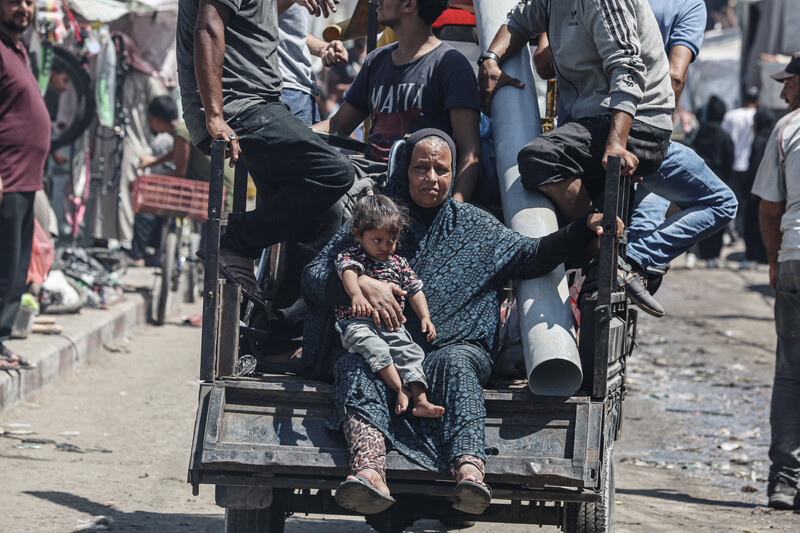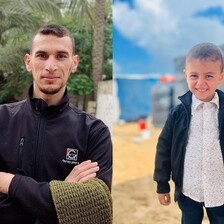The Electronic Intifada 28 October 2024

Movement itself has become a form of resistance. Here, in Deir al-Balah on 30 June 2024.
APA imagesOne day in September my husband and I were traveling down Gaza’s beach road.
To my left, the vast expanse of the Mediterranean Sea unfolded with its unspoken promise of freedom and peace.
To my right was a war-torn city.
My husband, Amir, and I clung to the sides of a donkey cart, the only available means of transportation, as we attempted to escape the suffocating chaos.
The road was a battlefield of its own – cracked, cratered and crowded with desperate souls. The sound of bombs echoed in the distance, a constant reminder that nowhere was safe.
Suddenly, the sharp screech of brakes and the sickening crunch of metal against wood jolted us from our thoughts.
A car had slammed into our cart, and in that split second, Amir’s quick thinking saved our lives. He threw his legs over the front of the cart, absorbing the impact, but leaving his legs bruised.
No protection
The war has left us with few transport options. The ones we have are fraught with danger. Donkey carts, once used for carrying goods, have become common, now carrying people trying to move from one place to another.
These carts offer no protection. They are open on all sides. I remember navigating through Al Attar Street in Al-Mawasi, where the crowd was so dense that we had to inch forward, barely moving.
Drivers shouted Dahrak, Dahrak, “your back,” a warning for passers-by to be careful as the carts squeezed through the throng of people.
The street was a chaotic mix of donkey carts, a few cars, bicycles and even a truck carrying displaced families.
The danger was everywhere – not just from the war, but from the desperate measures we were forced to take to survive. The once simple act of crossing the street had become a high-stakes gamble.
Donkey carts present not only a logistical danger but also a public health risk. The donkeys, often neglected and malnourished, attract swarms of flies that fill the air, creating unsanitary conditions.
The areas around these carts are littered and unclean. At such close quarters, the risk of contracting a virus or infection grows, a potentially fatal occurrence in a community struggling with limited healthcare resources.
The long walks
The relentless bombings have not only destroyed our homes but also the roads that connect us. What was once a 30-minute drive from my home in Khan Younis to my workplace in Gaza City now takes hours, if it’s possible at all.
It takes 30 minutes just to cover a single kilometer. The gridlocked streets and endless delays have made daily travel unbearable
The roads are littered with craters and debris, making it nearly impossible to travel safely or quickly. Ambulances struggle to navigate the ruined streets, and every bump, every twist sends a fresh wave of pain to those inside.
The overcrowding is unbearable. With so many people displaced from the north, southern roads are clogged with vehicles – trucks, buses and carts – each packed beyond capacity.
Drivers have resorted to using makeshift carts attached to cars to carry more passengers. The trucks too, designed for goods, are now filled with people and their belongings.
The smell of burning corn oil – an alternative to fuel – fills the air with a thick, acrid stench.
In some areas, there are no transportation options left. The roads are too damaged and the fuel too scarce. People are forced to walk long distances, often carrying whatever they could salvage from their homes.
I have walked for hours, sometimes with no clear destination, just in the hope of finding somewhere safer. The sun beats down, and the sound of drones buzzes overhead, but we keep walking – because stopping is not an option.
At the beginning of the war, just before the first seven-day truce on Gaza, I found myself in Deir al-Balah, in central Gaza, working on a relief project in the eastern areas. It was a day that tested my endurance like no other.
I had to travel from Khan Younis to Deir Al-Balah – a distance I can’t quite measure, but one that my feet will never forget. With transportation options severely limited, I was forced to walk for hours, navigating through the war-torn landscape on foot.
The roads were littered with debris, and the constant threat of airstrikes loomed overhead. Every step felt heavy, not just from exhaustion, but from the weight of the situation. By the end of that day, my feet were bruised and aching
The vulnerable
The war has had a catastrophic impact on Gaza’s most vulnerable, especially those who are already battling serious health conditions.
Salama Qaddoum, 75, from Shujaiya in the north, suffers from kidney failure.
His granddaughter Afnan recounted a particularly harrowing experience:
“On a rainy day, my dad and grandfather were traveling from Hamad City, where we were displaced, to Nasser Hospital for his kidney dialysis.”
In the middle of the road, the donkey cart they were using collapsed, Afnan told The Electronic Intifada. The fall broke Salama’s legs.
“Before the war, he could travel by ambulance,” Afnan said. “But now it’s impossible to find one. The constant displacement orders have forced my grandfather to endure long, grueling journeys on donkey carts, exacerbating his already fragile health.”
For me, the memory of 19 July is seared into my mind. Israel bombed our house, killing my brother and his son, and leaving me injured. I was rushed to hospital in an ambulance that struggled over the broken roads.
Every jolt sent a new wave of pain through my body. And when I was discharged, I had to rely on a donkey cart to get back, despite my injuries.
The pain was unbearable, but there was no other way. Once, as my legs were beginning to heal, a speeding bicycle collided with the cart I was in, nearly knocking me off. The roads are so crowded that it is impossible to avoid these accidents.
In a land where every sunrise brings the threat of annihilation, movement has become an act of defiance. The streets of Gaza, once bustling with life, have turned into treacherous pathways, haunted by the echoes of war.
Our simplest journey now feels like a perilous expedition, where the roads themselves seem to conspire against you. This is a story of survival, of navigating a city under siege, where the only certainty is uncertainty and every step is shadowed by danger.
Bashaer Muammar is a Palestinian activist and translator from Gaza.




